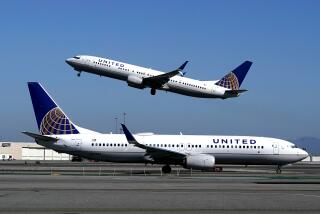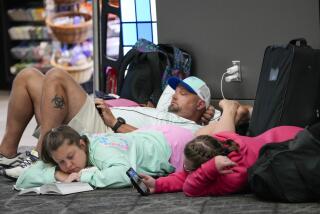2 Airlines to Post Gloomy 1st-Quarter Results as Business Travel Weakens
- Share via
United Airlines and American Airlines joined most major carriers Thursday in saying they will post first-quarter losses, owing mainly to reduced business travel in the face of the economy’s slowdown.
UAL Corp., the holding company for industry leader United, already planned to post a first-quarter loss because of higher fuel costs, weather disruptions and labor problems. But with the weakening economy, UAL said it now expects to lose substantially more than the $2.82 a share, or about $147 million, that was forecast by analysts surveyed by First Call/Thomson Financial.
The parent of No. 2 American, AMR Corp., cited similar problems in predicting a modest loss for the quarter. Airline analysts had looked for AMR to earn 34 cents a share, or about $56 million, in the quarter.
United and American join Delta Air Lines, Northwest Airlines and US Airways Group--which United is trying to acquire--in predicting gloomy first-quarter results. The latest culprit is a drop in demand among business travelers as corporate America looks for ways to shave costs to adapt to the softening economy.
“Companies are cutting back,” said Kevin Mitchell, president of the Business Travel Coalition, an advocacy group for business passengers. At a time when many companies are laying off workers, they’re also telling their remaining employees “let’s make sure every business trip we take is a must-do,” he said.
And the economic slowdown only exacerbates the existing turbulence in the aviation industry. Besides coping with still-high fuel prices, the four largest carriers are in contentious talks with employee unions over new contracts that ultimately will add to the airlines’ labor costs.
United already is feeling the effect of a costly new contract it signed with its pilots last year, but it’s still negotiating with its mechanics and flight attendants. United’s struggle also comes as the carrier is trying to wrap up its controversial plan to buy US Airways for $4.3 billion, a deal many fear would reduce competition and lead to higher fares.
And all the airlines are still under fire from many passenger advocates and lawmakers for the massive delays that have infuriated travelers over the last year.
Indeed, all the airlines were under attack again Thursday on Capitol Hill over widespread delays. Rep. Harold Rogers (R-Ky.), who chairs the House Appropriations transportation subcommittee, urged the airlines, their unions and other government officials to cut delays or risk federal intervention.
“The personal and commercial disruptions are nothing short of horrendous, and they’ve got to stop,” Rogers said. “If you can’t do your job, we’ll find someone who will.”
His panel heard testimony from the Transportation Department’s inspector general, Kenneth Mead, who said the government should step in to fix airport delays if the airlines won’t take actions such as shifting flights from peak travel times.
The “economic situation has deteriorated more than expected,” leading to a drop “in our higher-yielding, close-in bookings,” UAL Chairman James Goodwin said in a statement.
The drop-off in corporate travel, in fact, could prompt many airlines to start cutting their first-class and business fares as they struggle to keep their planes full, Mitchell said. That would be welcome news for travel managers, but could further chip away at the airlines’ profits.
All these warnings have prompted investors to dump airline stocks in recent weeks. But despite the latest warnings, bargain-hunting investors pushed airline stocks mostly higher Thursday.
UAL shares gained $1.45 to $36.55, while AMR rose $1.73 to $34.54. Delta was up 92 cents at $40.79 and Northwest rose 25 cents to $20, but US Airways shares slipped 8 cents to $33.52, all on the New York Stock Exchange.
In the meantime, huge companies such as General Electric Co., Cisco Systems Inc. and Black & Decker Corp. are slashing travel costs wherever possible. And a January survey by the National Business Travel Assn. showed that 24% of travel managers had cut their 2001 budgets--with 5% of them chopping their spending plans by 20% or more.
That’s a bitter pill to swallow for United and the other airlines, because business travelers account for the bulk of their profits. Business fliers tend to book tickets much closer to their departure dates than leisure passengers, for which corporate travelers pay much higher fares.
GE started using a travel-reservation system in August that includes a questionnaire that asks employees if an online meeting is possible rather than a plane trip, said spokeswoman Pamela Wickham.
“All the productivity that’s wasted by travel--in the car or on the way to the airport--you can set up a quick online meeting and you’re sharing documents real time,” Wickham said.
Black & Decker’s travel director, Peter Buchheit, said the Towson, Md.-based tool manufacturer is “doing anything we can to reduce the escalating costs” of travel. “Our average ticket price is down for the first two months of this year from last year.”
*
Times wire services were used in compiling this report.
More to Read
Inside the business of entertainment
The Wide Shot brings you news, analysis and insights on everything from streaming wars to production — and what it all means for the future.
You may occasionally receive promotional content from the Los Angeles Times.











